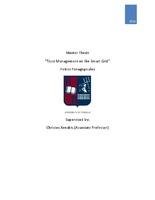Trust management on the smart grid
Διαχείριση εμπιστοσύνης σε έξυπνα δίκτυα ενέργειας

Προβολή/
Λέξεις κλειδιά
Smart grid ; Trust management ; Distributed Hash Table (DHT) ; Simulation methods ; SecurityΠερίληψη
The Smart Grid has come to modernize the traditional electric power grid with applications
which contribute to more effective power distribution and management with a more reliable
manner in comparison with the ageing power grids of today. The deployment and use of the smart grid will have great social effects and benefits since the
power distribution on demand makes it more eco-friendly, saves money, assists the fault
handling and mitigates the unavailability to the electric power due to grid corruptions. But since
it is based on a digital networked infrastructure it should be secure and the best way to prevent
any incidents is to deploy technologies, systems and networks that are designed, developed
and tested to achieve secure operation.
One of the major security concerns in the smart grid is how the infrastructure will operate on a
trusted basis, in order to assure its normal operation in terms of availability, integrity and
confidentiality. There are numerous attacks for the smart grid which could mitigate the
availability of the utility’s control systems with various consequences or to lead to incorrect
billing and data theft or to affect the communication protocols that are used in the smart grid. Let’s say that a smart meter, which is an advanced meter that measures with high precision the
power consumption, wants to send the data back to the utility for load balancing and billing
purposes. The utility should trust the specific smart meter in order to take into account the
information that receives from it, otherwise to exclude the data and take further actions for the
malicious node. It becomes necessary to establish a trust management scheme on the smart
grid which will facilitate the power electric utility to accumulate the data and to establish
secure communications. This master thesis deals with the problem of the key management in the smart grid in order to
establish trust among the participants of the network. A standard solution of a Trust
management scheme is using a Public Key Infrastructure which brings many tradeoffs due to its
centralized architecture and the way that the certificates are produced and maintained. In
order to maintain the operation of the system in case of a centralized PKI failure and mitigate
the costs we examine the solution of the Web-of-Trust reputation concept in the smart grid
which could coexist with a PKI solution. This solution is built on top of a Distributed Hash Table
for efficient lookups of trust relationships and has been simulated with the Oversim P2P
network simulation framework which is part of the Omnet++ simulation environment.
Following, we study the concepts presented above, how they can work all together and how
the solution simulated in the network simulator.

